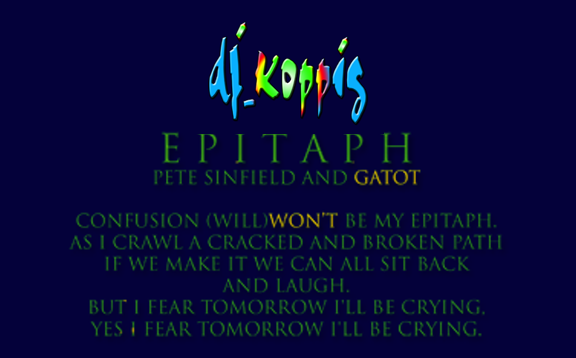 This album has hardly the clique it can be imagined (rock-symphonic more truthful and literally than usual, orchestral loose connections, Yes repetitions made in the light of an non-exquisite musicality etc.), but also hardly is it the great album it can, also, be commercialized or placed accessibly/excessively (by having a low draft of Yes music, by reaching the nuances of a signaling quality, not, however, of a great discovery, by expressing the music of a soul-wrap, but also of a constant beat, as if it would Yes would stick at things they played and can't play anymore, or at styles they can expand, respectively can't exhaust with anything else). It's hardly even an album to categorize, rather than to feel as a powerful listening attitude and a, however low, composition vibration and original streak-giving. It's a relaxing mood album by Yes, proposed in times that need a support in creationist (or expansive) plays, it's a light composition made out of lighter (by the questioning classic taste) repertoire, it's, finally, an album which entertains the Yes symbol and label, in a shape that's slightly irresistible, slightly of afterimage, and slightly of music's simple emotion. Grandeur should be locked elsewhere, but in the same there aren't means for this creative passion concert to show signs of originality, of clear-obscure meanings, of anything too persistent in a great or a leading role. Remembering the many faults or weak calibers of contemporary Yes, this sort of impression, under a very good (maybe just constrict) interpretation, is full of powerful sound and the good mood. Lives, in particular, are a must when Yes, in studio record-toxin, have little to do with the usual progressive euphoria. And the classic, however amble in so many repetitions and similarities, goes upper-handed as the perfect music for a viable joy, a characteristic touch, a self-assuring value and a delicate discipline of fantastic (successful?) warmness.
This album has hardly the clique it can be imagined (rock-symphonic more truthful and literally than usual, orchestral loose connections, Yes repetitions made in the light of an non-exquisite musicality etc.), but also hardly is it the great album it can, also, be commercialized or placed accessibly/excessively (by having a low draft of Yes music, by reaching the nuances of a signaling quality, not, however, of a great discovery, by expressing the music of a soul-wrap, but also of a constant beat, as if it would Yes would stick at things they played and can't play anymore, or at styles they can expand, respectively can't exhaust with anything else). It's hardly even an album to categorize, rather than to feel as a powerful listening attitude and a, however low, composition vibration and original streak-giving. It's a relaxing mood album by Yes, proposed in times that need a support in creationist (or expansive) plays, it's a light composition made out of lighter (by the questioning classic taste) repertoire, it's, finally, an album which entertains the Yes symbol and label, in a shape that's slightly irresistible, slightly of afterimage, and slightly of music's simple emotion. Grandeur should be locked elsewhere, but in the same there aren't means for this creative passion concert to show signs of originality, of clear-obscure meanings, of anything too persistent in a great or a leading role. Remembering the many faults or weak calibers of contemporary Yes, this sort of impression, under a very good (maybe just constrict) interpretation, is full of powerful sound and the good mood. Lives, in particular, are a must when Yes, in studio record-toxin, have little to do with the usual progressive euphoria. And the classic, however amble in so many repetitions and similarities, goes upper-handed as the perfect music for a viable joy, a characteristic touch, a self-assuring value and a delicate discipline of fantastic (successful?) warmness.Three grand Orchestras are booked into transposing the Yes spirit (up to the Yes particular music, of course) and into enjoying the orchestral cluster of a rock possible festive. Something sounds like Rick Wakeman's close to moody habits of using orchestras and classic tempos. But of course, he isn't present in here. The Yes ensemble is in fact very short and consensually good, the play is even more obscure, for anyone expecting the Yes powerful chords or the blissing new rock sounds. This is perfect for the orchestral ambiance, but some gaps appear, either in the "classic rock" thing (which is truly a clique word, for the simple ambiances and concept tones of this gesture), or in the power of the orchestras to consequently adapt powerful, complete or despondent Yes gems. The musicianship within Symphonic Music Of Yes is talented, but light, easy-playing and charmingly-tasty. Giving times or just the momentary lone listen, the projects makes successful eras, in mostly all its moments or its trusting takes.
The music bytes of this album is consequent to the entire, already discussed, tempered standard. Some pieces evolve to their "acoustic" or "classical" sense (or are orchestrally mastered) better, other don't match too much symphonic extra value, and the small left hissings the product endeavors are, unsubstantially, a very superficial work. The orchestral gloss mostly will seem like it has the forgiving taste and a benevolent involvement in portraitures of the classic Yes pieces in an easy, accessible or enjoyable color, transposing the notes by pick, or doing some spirit/symbolic interpretations of it - out of this, the best pieces are those who rarely exclude the Yes "original" flavor, but also hardened to harmony to its valuable charisma (in moments of great expansion or small corrections, in moods of breakable chords or dignifying static forms). There are then the pieces which include Yes's full participation - leading even to the rock electric sound or the total influence of what, in the known original version, "orchestrated" everything - to this point, the music its utmost accessible work paint, still things evolve to being the relaxed expression. The usual tempo of the works is slow and magical, clean and syrupy. The atmosphere is one full of breaks, the needle hazard of the regular classic pieces being arguably touched by no special magic at all is sharp and blunt, the attitude of Yes in the entire project is moderate, but not selfish, congruent, but not mind blowing. Constantly there is more emotion then value, more melody than sound, more acousticism then the rowing rock and more refined taste than cheap diversification.
A confident vote to something distant from the essential, progressive or defining Yes taste, yet course-correcting, from the pompous means of adapting music to the very harmonic, feeling-embraced and quietly-touched sensations of stubborn simple Yes. A mere album of different values (and visions, partially) makes the most peaceful noise, out of many surrounding and disturbing rock-phony involuted values. Making a symphonic approach, an orchestral caramelized loose and a concept of music-magic desire is everything that survives from Symphonic Music Of Yes. It's worth it.
Track List :
01. Roundabout (6:10)
02. Close To The Edge (7:39)
03. Wonderous Stories (3:53)
04. I've Seen All Good People (3:50)
05. Mood For A Day (3:01)
06. Owner Of A Lonely Heart (4:43)
07. Survival (4:17)
08. Heart Of The Sunrise (7:49)
09. Soon (6:16)
10. Starship Trooper (7:16)
Line-up :
- Steve Howe / guitar, vocals
- Bill Bruford / drums
- Jon Anderson / vocals
with
- Tim Harries / bass
- Julian Colbeck / hammond organ
- David Palmer / synthesizer, piano, Hammond organ
- London Philharmonic Orchestra
- English Chamber Orchestra
- London Community Gospel Choir









1 comment:
http://www.megaupload.com/?d=AFA93CXF
Post a Comment